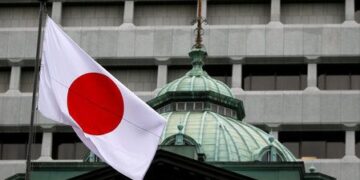DUBAI (Reuters) -Iran and the United States agreed on Saturday to begin drawing up a framework for a potential nuclear deal, Iran’s foreign minister said, after talks that a U.S. official described as yielding “very good progress.”
U.S. President Donald Trump, who abandoned a 2015 nuclear pact between Tehran and world powers during his first term in 2018, has threatened to attack Iran unless it reaches a new deal swiftly that would prevent it from developing a nuclear weapon.
At their second indirect meeting in a week, Iranian Foreign Minister Abbas Araqchi negotiated for four hours in Rome with Trump’s Middle East envoy Steve Witkoff through an Omani official who shuttled messages between them.
Speaking on state TV after the talks, Araqchi described the engagement as useful and conducted in a constructive atmosphere.
“We were able to make some progress on a number of principles and goals, and ultimately reached a better understanding,” Araqchi said.
“It was agreed that negotiations will continue and move into the next phase, in which expert-level meetings will begin on Wednesday in Oman. The experts will have the opportunity to start designing a framework for an agreement,” he said.
The top negotiators would meet again in Oman next Saturday to “review the experts’ work and assess how closely it aligns with the principles of a potential agreement,” he added.
Echoing cautious comments last week from Supreme Leader Ali Khamenei, he said: “We cannot say for certain that we are optimistic. We are acting very cautiously. There is no reason either to be overly pessimistic.”
Iran, which calls its nuclear programme peaceful, says it is willing to discuss limited curbs to its atomic work in return for lifting international sanctions.
A Trump administration official confirmed that the two sides agreed to meet again next week.
“Today, in Rome over four hours in our second round of talks, we made very good progress in our direct and indirect discussions,” the official said.
Trump told reporters on Friday: “I’m for stopping Iran, very simply, from having a nuclear weapon. They can’t have a nuclear weapon. I want Iran to be great and prosperous and terrific.”
Washington’s ally Israel, which opposed the 2015 agreement with Iran that Trump abandoned in 2018, has not ruled out an attack on Iran’s nuclear facilities in the coming months, according to an Israeli official and two other people familiar with the matter.
Since 2019, Iran has breached and far surpassed the 2015 deal’s limits on its uranium enrichment, producing stocks far above what the West says is necessary for a civilian energy programme.
A senior Iranian official, who described Iran’s negotiating position on condition of anonymity on Friday, listed its red lines as never agreeing to dismantle its uranium enriching centrifuges, halt enrichment altogether or reduce its enriched uranium stockpile below levels agreed in the 2015 deal.
(Writing by Parisa Hafezi; Additional reporting by Joshua McElwee in Rome; Editing by Peter Graff, Raju Gopalakrishnan, Kirsten Donovan and Daniel Wallis)
By Parisa Hafezi

















